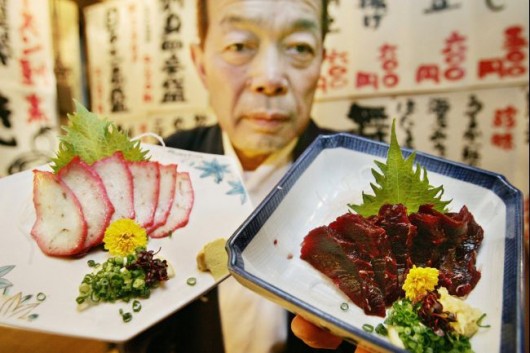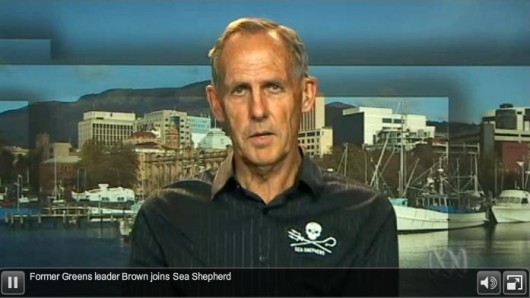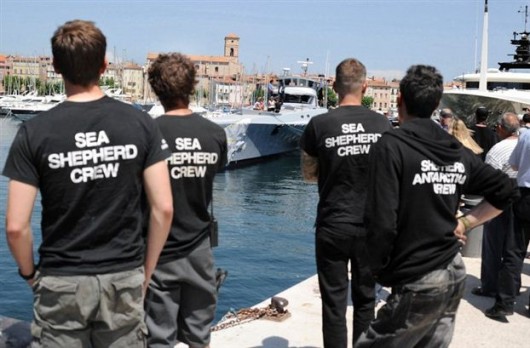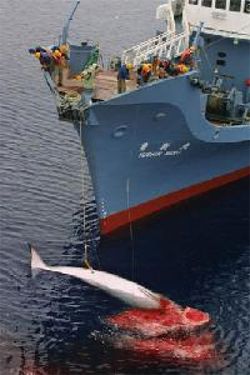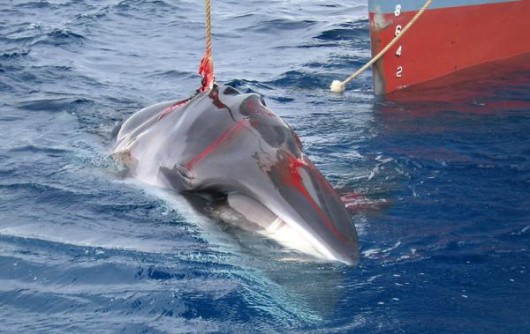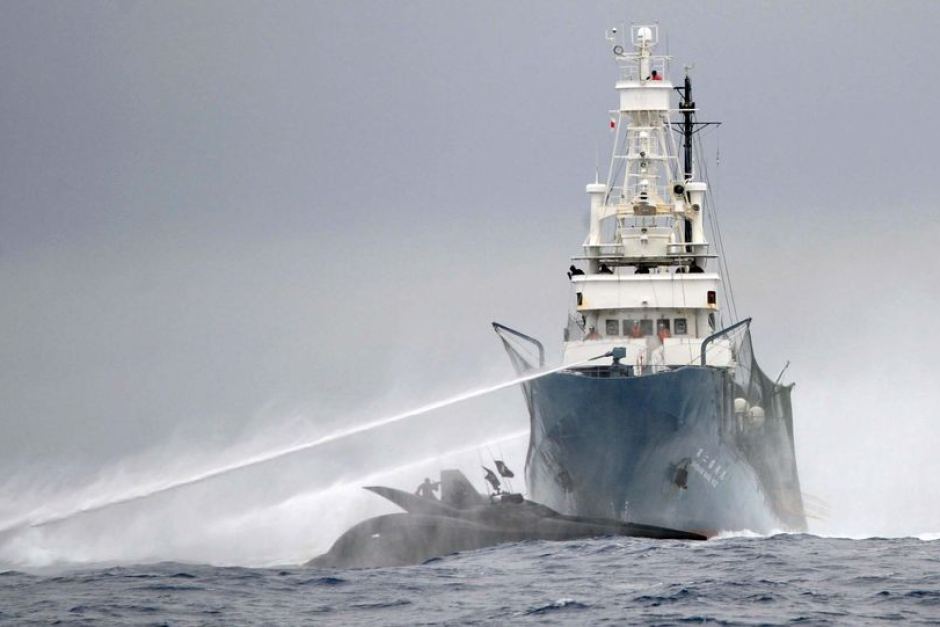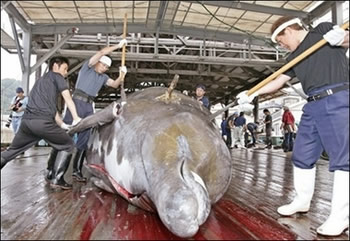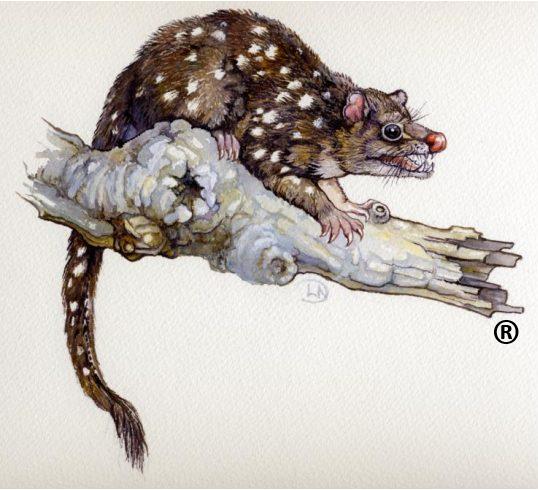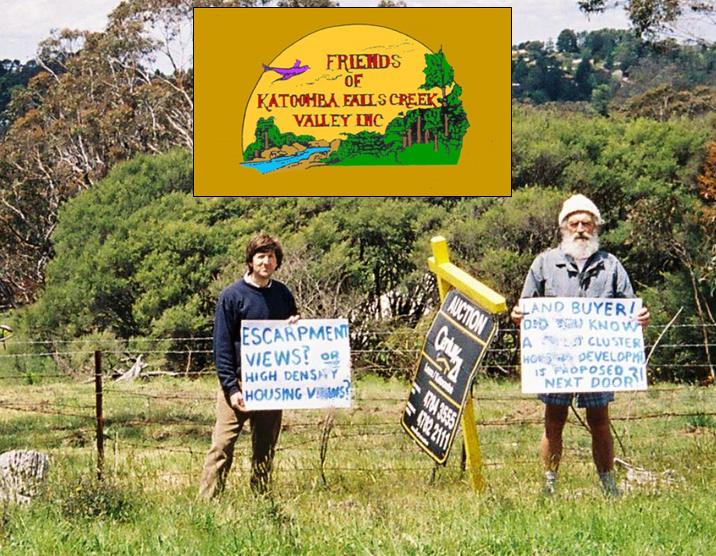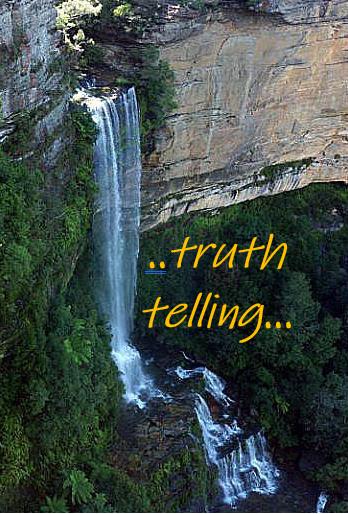I’ll stop the whale killings, vows Kevin Rudd
Monday, February 11th, 2013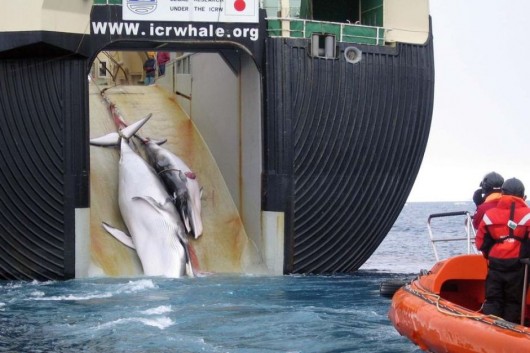 Minke Whale mother and her calf
Japanese ICR Whale Blood Sport
Japanese Men Only
[Source: Sea Shepherd]
Minke Whale mother and her calf
Japanese ICR Whale Blood Sport
Japanese Men Only
[Source: Sea Shepherd]
.
Feb 2008:
.
<<(Then Australian) Prime Minister Kevin Rudd has vowed to do whatever it takes to end Japan’s whale hunt as the bloody slaughter continued yesterday.
Mr Rudd’s declaration came as Japanese companies scurried to try to minimise a consumer backlash over whaling.
A people-power campaign has begun against the Japanese whalers, spearheaded by The Daily Telegraph, with 100,000 people signing a petition of outrage.
Yesterday Mr Rudd joined the Australian people in demanding Japan cease its so-called “scientific whaling program”.
.
Mr Rudd:
“I want to see an end to whaling. I don’t have a magic wand, but the Australian Government will do everything within our power to put pressure on the Japanese whalers to bring this slaughter to an end. Australia and Japan have a strong relationship, but that strength demands that we leave the Japanese in no doubt that Australia will continue to campaign to bring an end to whaling once and for all.”
.
Mr Rudd said he had instructed Foreign Minister Stephen Smith to “exert real pressure” on the Japanese to end the program. However, talks this week between Mr Smith and his Japanese counterpart Masahiko Koumoura have been deadlocked. As the Japanese continued to harpoon and slice up minke whales throughout the day, Mr Smith emerged from talks saying the two men had “agreed to disagree“.
[Ed: What is Japanese for ‘up yours‘ ?]
.
Consumers have now called for boycotts of all Japanese products, sending some of Japan’s biggest companies into a panic. Hayley Wilson, 21, of Surry Hills said she thought boycotts were the only solution: “Nothing else seems to be working.”
Big name Japanese companies immediately went into overdrive. Electronics giant Sanyo has written to the Japanese Consulate in Sydney voicing its concern about a consumer backlash. Sony Australia called on Australians to reconsider the approach and Mazda also begged Australians not to target its products.>>
.
[Source: ‘I’ll stop the whale killings, vows Kevin Rudd’, 20080202, by Joe Hildebrand and Lauren Williams, The Daily Telegraph, ^http://www.dailytelegraph.com.au/news/indepth/ill-stop-the-whale-killings/story-e6frev90-1111115455345].
Jun 2008:
.
 Australian PM Kevin Rudd : ‘Whatever. You win’
to a stronger willed Japanese PM Yasuo Fukuda.
(Photo: Glen McCurtayne)
Australian PM Kevin Rudd : ‘Whatever. You win’
to a stronger willed Japanese PM Yasuo Fukuda.
(Photo: Glen McCurtayne)
.
<<Kevin Rudd has “agreed to disagree” with Tokyo on the issue. Prime Minister Kevin Rudd has effectively conceded defeat on his plan to stop Japanese whaling, declaring after talks in Tokyo that Australia and Japan have agreed to disagree on the issue..
Ed: ‘Whatever happened to the days way back, when the world was safe
And it seemed worth saving,
We search for leaders on our hands and knees..’
.
[Source: Richard Clapton, Song: ‘Best Years of Our Lives’, 1989, Australian singer-songwriter and guitarist from Sydney; off his album: ‘The Best Years of Our Lives’, on WEA Label 256582, ^http://www.richardclapton.com/?page_id=629 ].
<<The long-awaited talks between Mr Rudd and his Japanese counterpart, Yasuo Fukuda, concluded yesterday with both leaders saying the Japan-Australia relationship was too important to be disrupted by their disagreement over whaling.
Mr Rudd later insisted that Labor’s policy had not changed from last year, when he demanded that the Howard government take Japan to the International Court and pledged that Labor would do so.
But he made it clear yesterday that Labor now had no plans to take Japan to court and would instead pursue its complaints through normal diplomatic channels and through its campaign to reform the International Whaling Commission.
.
Mr Rudd:
“Prime Minister Fukuda and I have agreed that you can have disagreements between friends” (with Mr Fukuda at Rudd’s side, who understands English). “This disagreement should not undermine in any way the strong relations between our two countries … we will be working diplomatically for the period ahead.”
.
This means, in effect, that after Labor’s election campaign pledge to haul Japan before the International Court, and after the Government spent $1 million sending a Customs vessel to follow the Japanese whaling fleet last summer to collect video evidence, Australia’s policy on whaling is now back where it started.
Mr Rudd immediately came under attack from anti-whaling groups and the Opposition, which said it was not good enough to “agree to disagree” and called on the Government to announce its long-delayed special envoy on whaling.
.
Last summer the Japanese killed 551 minke whales, the most abundant whale species. This was well short of its target of 850 minkes and 100 larger whales.
.
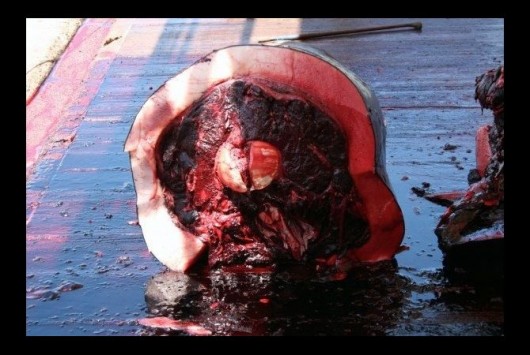 Japanese Sport Whale Meat
… blood sport as usual.
Japanese Sport Whale Meat
… blood sport as usual.
.
Ecologist and former Australian of the Year Tim Flannery has argued that Australia should not oppose the Minke kill, saying it frees up food in the oceans for the larger, endangered whales.
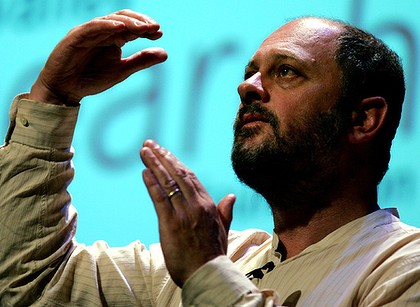 Darkside Ecology: when ecological knowledge is applied to kill wildlife
..selling skills, selective statistics, academic theories and even convincing hand movements..and all.
…meanwhile, Japanese whale blood sport as usual…
Darkside Ecology: when ecological knowledge is applied to kill wildlife
..selling skills, selective statistics, academic theories and even convincing hand movements..and all.
…meanwhile, Japanese whale blood sport as usual…
.
Mr Fukuda was keen to talk about the whaling issue, raising it in private discussions over lunch as well as in formal talks. But the Australian side saw no shift in his stance, and in his public statement he emphasised that diplomacy had triumphed.
“We agreed to engage in further discussion, so that differences on this issue will not underline good bilateral relations,” he said.
The talks took place amid political turmoil in Japan, after Mr Fukuda was censured by the Opposition-controlled Upper House for making people over 75 meet more of their medical costs. But Mr Fukuda took two hours off his domestic troubles for an hour of official talks followed by lunch with Mr Rudd.
Importantly, he gave support to Mr Rudd’s initiative to try to tighten the nuclear non-proliferation treaty by setting up an international commission co-chaired by former foreign minister Gareth Evans and holding an international conference to discuss how the treaty can be made more effective.
In a communique, the two leaders did not mention whaling. But they emphasised the strengths of the bilateral relationship, which has been questioned after the sharp dispute over whaling and after the Rudd Government’s decision to pull out of talks between the US, Japan, India and Australia – which China saw as aimed against it. Instead, the leaders agreed to strengthen bilateral and trilateral defence co-operation.
Responding to Mr Rudd’s retreat on whaling, Greenpeace Australia Pacific chief executive Steve Shallhorn said it was time to move on the appointment of a whaling envoy “because regular diplomatic channels are clearly not working”.
Opposition environment spokesman Greg Hunt said the failure to announce the appointment sent a message to Japan that Labor was only interested in the whaling issue for domestic purposes. He also said the Government’s election promise to take Japan to the International Court “was always a fraud“.>>
.
[Source: ‘Rudd lets Japan off hook’, 20080613, by Tim Colebatch, Tokyo correspondent, Fairfax, with Andrew Darby and Brendan Nicholson, The Age newspaper (Melbourne), ^http://www.theage.com.au/national/rudd-lets-japan-off-hook-20080612-2pnx.html].
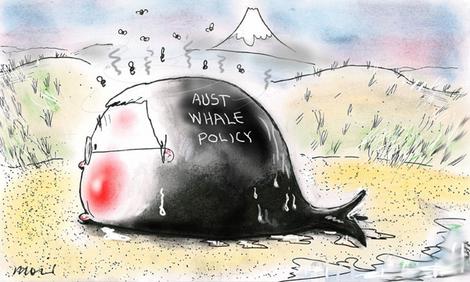 Peace in Our Time
During his trip to Japan, Kevin Rudd emphasised the need for a diplomatic solution to the disagreement
[Source: ‘smith-defends-labors-whaling-strategy’, 20080615, Alan Moir cartoon, Sydney Morning Herald,
^http://www.smh.com.au/news/whale-watch/smith-defends-labors-whaling-strategy/2008/06/15/1213468229545.html]
Peace in Our Time
During his trip to Japan, Kevin Rudd emphasised the need for a diplomatic solution to the disagreement
[Source: ‘smith-defends-labors-whaling-strategy’, 20080615, Alan Moir cartoon, Sydney Morning Herald,
^http://www.smh.com.au/news/whale-watch/smith-defends-labors-whaling-strategy/2008/06/15/1213468229545.html]
.
Dec 2009:
.
<<The Rudd Government has reneged on a promise to send an Australian ship to monitor Japan’s annual slaughter of 1000 minke, humpback and fin whales.
The Opposition said an Australian ship must be sent to gather evidence for use in a promised international courts case to stop the whaling.
The annual Japanese whale kill is in full swing despite a promise by the Rudd Government in May 2007 to take Japan to the international courts to stop the slaughter.
Opposition environment spokesman Greg Hunt wrote to Environment Minister Peter Garrett and demanded he honour the Government’s promises to monitor – and ultimately bring an end – to the whale slaughter.
.
Mr Hunt:
“We are now facing the third whaling season since this promise was made and I ask that you agree now to dispatch a non-military observation vessel to the Southern Ocean by January 5, (2010).”
.
The Humane Society International (HSI) said Japan’s own figures, revealed in secret documents discovered at the International Whaling Commission meeting being held this week, showed the “true, disgusting nature” of the country’s whale hunting.
“The purpose of this would be both to chronicle the tragic slaughter of these majestic creatures and to act as an intermediary in the case of conflict between the Japanese whaling fleet and non-government organisations.”
A spokesman for Mr Garrett said the Rudd Government had honoured its promise to monitor the cull in 2008 when it spent $1 million sending the customs ship the Oceanic Viking to observe the cull. That mission captured damning pictures of Japanese whalers killing a mother whale and its calf but the evidence was never used to take Japan to court, although it did reduce the Japanese whale cull that year. [Ed: See image at the start of this article.]
Japan’s whalers blamed “relentless interference” from environmentalists and the Australian surveillance ship for the fact they only took 551 minke whales out of a maximum quota of 935 in early 2008.>>
.
[Source: ‘Prime Minister Kevin Rudd soft on Japanese whales slaughter’, 20091228, by Sue Dunlevy, The Daily Telegraph (Sydney newspaper), ^http://www.dailytelegraph.com.au/news/indepth/prime-minister-kevin-rudd-soft-on-japanese-whales-slaughter/story-e6frev90-1225813992329].
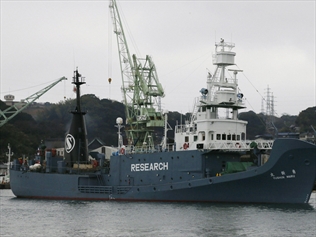 Research has become an internationally interpreted Japanese word for
‘Whale Blood Sport’
Research has become an internationally interpreted Japanese word for
‘Whale Blood Sport’
.
Jan 2010:
.
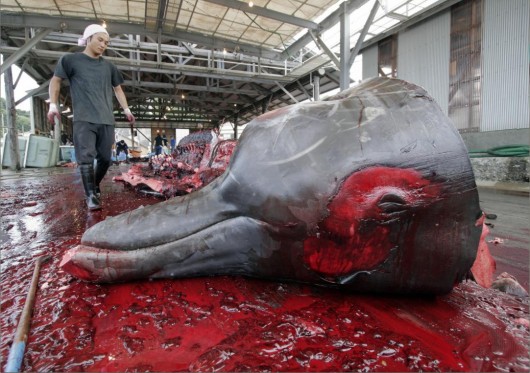 A criminally violent blood sport
No-one wants the whale meat.
It is all about Japanese Men Only cultural barbarism
A criminally violent blood sport
No-one wants the whale meat.
It is all about Japanese Men Only cultural barbarism
.
<<Japan has risked an open breach with the Rudd government by hitting back hard at Acting Prime Minister Julia Gillard’s handling of last week’s whaling confrontation in the Southern Ocean.
Ministry of Foreign Affairs officials have accused Ms Gillard of aggravating the whaling controversy between Tokyo and Canberra, and called for Australian action to prevent further illegal activities by the Sea Shepherd Conservation Society.
The officials warned a senior Australian diplomat on Friday that Ms Gillard’s statements immediately before and after the collision between Sea Shepherd’s speedboat and a Japanese whaling ship were inflaming public opinion in Japan and making diplomatic resolution of the underlying dispute harder to realise.
This is the toughest public stance a Japanese government has taken towards Australia on Antarctic whaling — or any other issue — in recent times and is also highly unusual in singling out for criticism a senior member of a friendly government.
The move betrays Japanese frustration with the Australians’ political management of the issue, including Kevin Rudd’s repeated threats of international legal action against so-called scientific whaling, while not obviously helping to curb hazardous protest activities, including Sea Shepherd’s efforts to disable whaling ships.
Ministry of Foreign Affairs senior officials told acting japanambassador Allan McKinnon it was “not appropriate” for Ms Gillard to urge Japanese whalers and the activists in equal terms to show restraint, “notwithstanding the Sea Shepherd itself was conducting the unlawful rampage”.
Sea Shepherd accuses the Shonan Maru 2 crew of deliberately running over Ady Gil during a day of confrontation in which the activists’ speedboat ran across the Japanese factory ship’s bow and allegedly tried to entangle its propellers.
Ms Gillard yesterday stood by her call for calm on both sides and for Japanese and Sea Shepherd skippers to ensure crews’ safety as their first duty.
“These are extremely dangerous conditions and it is likely Australia would be called upon to deploy a search and rescue mission if things were to go horribly wrong,” Ms Gillard said. “It is not therefore inappropriate for Australia to call for calm from both sides in these circumstances.”
Japanese officials questioned the jurisdiction of Australia’s Maritime Safety Authority to investigate last week’s collision. Without access to the crew of Shonan Maru 2, any finding by an Australian inquiry into the collision is likely to be meaningless.
The Japanese have agreed to co-operate with a New Zealand investigation (Ady Gil was New Zealand-registered) and they are expected to vigorously contest a piracy complaint lodged in a Dutch court by Sea Shepherd on Friday.
Sea Shepherd leader Paul Watson said yesterday the group was aiming to secure a charge of attempted murder against the Japanese crew.
“That’s what the crew of the Shonan Maru tried to do, the video makes that clear,” Mr Watson said from the Steve Irwin, which continues to pursue the whaling fleet.
“If I rammed and sank a Japanese vessel in Australian territory, the Australian navy would be on its way down here right now to arrest me.”
Ministry of Foreign Affairs officials, in answer to questions from The Australian, have called for the Australian Federal Police to investigate Sea Shepherd’s actions the next time its vessels put into an Australian port.
Japanese officials were already annoyed that the Steve Irwin, which uses Australian ports for its annual Southern Ocean campaigns, was allowed to put into Hobart without question late last month after initiating the first clashes of the season.
They told Mr McKinnon that Ms Gillard’s call for the Institute of Cetacean Research to suspend charter flights monitoring the Sea Shepherd vessels that have been harrying the whaling fleet since mid-December “has already unnecessarily provoked the Japanese public opinion”.
“This has invited the Japanese public (to) call for a strong protest and it might impair both governments’ will to lead the whaling issue to a resolution through diplomatic efforts,” said a Foreign Ministry spokesman.
Japan aims to slaughter nearly 1000 minke whales this summer for “scientific research”, as well as 20 rare fin whales and 50 humpbacks. It has urged Canberra to distinguish between official Australian opposition to Antarctic whaling and illegal acts in international waters that put at risk Japanese crewmen and ships.
 A culture that has long celebrated brutal killing
A culture that has long celebrated brutal killing
.
On Wednesday, before news of the collision and in response to a newspaper report about the charter flights, Ms Gillard said: “We do not condone this action by the Japanese government at all and we are certainly urgently seeking legal advice about this conduct.” On Friday, she said: “Ending whaling will happen through diplomacy or legal action; it’s not going to happen on the high seas. And because we are pursuing diplomacy, I am in a position to advise that our embassy in Tokyo has made high-level representations to the Japanese government.”
Ms Gillard said Australia’s diplomats in Tokyo had made clear to the Japanese the government’s strong view that Japanese whaling had to cease: “We are pursuing diplomacy with all of our force. We have made it absolutely clear we are not ruling out taking international legal action.”
At that stage, Ministry of Foreign Affairs officials would not confirm Thursday’s discussion with Mr McKinnon but The Australian understands that later on Friday they asked him for another meeting, at which they delivered the toughened message.
Ms Gillard yesterday maintained that the Australian government was “pursuing its anti-whaling position through the appropriate diplomatic and legal channels very strongly”.
“The government also respects the right of those who also oppose whaling to protest, and to do so peacefully,” she said.
Opposition foreign affairs spokeswoman Julie Bishop said yesterday the government’s handling of whaling was damaging Australia’s relationship with Japan.
She said Mr Rudd should either fulfil his pre-election promise to pursue international legal sanctions against Japan or withdraw the threat.>>
.
[Source: ‘Japan pins whale row on Gillard’, 20100111, by Peter Alford, Tokyo correspondent, The Australian (newspaper) with additional reporting by Samantha Maiden and Debbie Guest, ^http://www.theaustralian.com.au/news/nation/japan-pins-whale-row-on-gillard/story-e6frg6nf-1225817884055].
Feb 2010:
.
<<Prime Minister Kevin Rudd says Japan must stop Southern Ocean whaling by November 2010 or face an international legal challenge.
The diplomatic heat between Australia and Japan appears not to have deterred whalers in the Antarctic cold.
As Japanese Foreign Minister Katsuya Okada met Prime Minister Kevin Rudd in Sydney yesterday, the whaling factory ship Nisshin Maru was steaming through the heart of an Australian Antarctic whale sanctuary, anti-whaling activists aboard the Sea Shepherd vessel the Steve Irwin claim.
The pursuers took this image of the Nisshin Maru behind a GPS locator that showed its position as 65 degrees 11 minutes south, and 78 degrees 8 minutes east. That is only about 100 nautical miles from Australia’s Davis Station in eastern Antarctica, well inside the 200-nautical-mile Exclusive Economic Zone (EEZ).
Sea Shepherd pursuers.
In protected waters … a GPS locator aboard the Steve Irwin shows the Japanese whaler is just 100 nautical miles from Davis Station and well inside the Australian Exclusive Economic Zone.
 GPS confirms Japanese whaler illegally trespassing inside the Australia Exclusive Economic Zone
PM Kevin Rudd at the time did nothing about it.
GPS confirms Japanese whaler illegally trespassing inside the Australia Exclusive Economic Zone
PM Kevin Rudd at the time did nothing about it.
.
”It’s almost like a slap in the face,” Sea Shepherd leader Paul Watson said from the Steve Irwin. ”They were skirting the EEZ by about a mile until Friday and then they dove down into it.”
Advertisement
Mr Rudd has strongly objected to the ”slaughter of whales” in the sanctuary declared throughout the EEZ. Whaling is banned in all Australian waters and the hunt’s illegality in this polar sanctuary was upheld in a 2008 Federal Court case brought by Humane Society International. In response to Mr Rudd’s warning on Friday that whaling must be brought to an end or Australia will go to an international court by November, Mr Okada reiterated Japan’s view that it was legal.
Mr Okada met Mr Rudd at Admiralty House in Kirribilli yesterday. His spokesman, Hidenobu Sobashima, said:
”In light of the importance of Australia-Japan relations … we hope that the two countries will confirm it is imperative to reach a diplomatic solution.”
Mr Okada will meet Foreign Minister Stephen Smith in Perth today before returning to Tokyo.>>
.
[Ed: Came to nothing: …how’s your father, tasty food…Whatever. You win!]
.
[Source: ‘Gotcha! Activists cry foul as whaling ship breaches sanctuary’, 20100221, by Andrew Darby, Brisbane Times, ^http://www.brisbanetimes.com.au/environment/whale-watch/gotcha-activists-cry-foul-as-whaling-ship-breaches-sanctuary-20100220-ompe.html].
Jan 2011:
.
<<The former prime minister Kevin Rudd launched legal action against Japan’s whaling program despite opposition from senior ministers and officials who warned it was likely to fail and strengthen the hand of the Japanese.
Leaked United States diplomatic cables also indicate that the decision to take Japan to the International Court of Justice was designed to divert public pressure on Labor over whaling.
The Department of Foreign Affairs warned that the case against Japan’s ”scientific” whaling would ”either fail completely or, at best, set up the Japanese to simply make changes to their program to improve the science”.
And a senior Australian diplomat told the Americans that both the then foreign minister Stephen Smith and the trade minister Simon Crean had made clear their opposition to an international legal challenge.
According to the cables, obtained by WikiLeaks and provided exclusively to the Herald, officials told US diplomats that even if successful, legal action against Japan would be ”unlikely to stop the whale hunt entirely”.
They added that ”equally importantly, such action would probably take a long time, removing some of the pressure on the government for the next few years”.
The government yesterday attempted to play down earlier revelations that Australia had been prepared to secretly negotiate a compromise to allow continued Japanese whaling.
The acting Attorney-General, Brendan O’Connor, said that the ICJ case demonstrated that the government was not soft on whaling. ”I think that underlines the seriousness of the matter and the fact that this government … opposes whaling and will continue to fight through the courts,” he said.
But the new embassy cables show that the government’s advisers were deeply pessimistic about the prospects of success in any legal action.
In October 2008, as officials were working to develop their case, the US embassy reported to Washington that domestic political considerations were high in Mr Rudd’s thinking. It said he was likely to eventually see legal action ”as the least damaging politically of his limited choices in dealing with public anger over whaling”.
However, the embassy also reported the Foreign Affairs Department’s environmental strategies director, David Dutton, had admitted that his department and the Attorney-General’s Department ”had long shared the view that international legal action against Japan’s whaling program has a limited chance of success”.
Mr Dutton told US diplomats that the Attorney-General’s Department had ”recently done an about face” to argue that the prospects for success at the ICJ were ”high enough to justify taking action”.
Mr Dutton said the Foreign Affairs analysis was that the only basis for effective action was that Japan’s whaling violated the International Whaling Convention because it did not achieve substantive scientific outcomes.
”[Foreign Affairs] continues to believe that such a challenge will either fail completely or, at best, set up the Japanese to simply make changes to their program to improve the science,” the US embassy reported to Washington.
The cables also reveal that the Rudd cabinet was ”very divided” over how to deal with whaling, with the prime minister reported to have been ”increasingly worried that the Japanese will forge ahead despite Australian concerns”.
The embassy reported that Mr Dutton had said that Mr Smith and Mr Crean ”had made clear their opposition to an international legal challenge, but opined that … DFAT and by extension [Mr] Smith had ceased to have much relevance in influencing the PM’s office on this issue”.
When they announced the legal challenge in May last year, Mr Smith and the then environment minister Peter Garrett said the government had ”not taken this decision lightly”.
However, the cables also reveal that domestic politics featured prominently from the start of the government’s consideration of possible legal action against Japan.
Soon after the election of the Labor government, the embassy reported Australian government contacts were saying that referring Japan’s whaling program to the ICJ ”would be unlikely to stop the whale hunt entirely, but could well force modifications that would make it more difficult for the Japanese”.
The embassy’s contacts also suggested that ”equally importantly, such action would probably take a long time, removing some of the pressure on the government for the next few years”. Australia is not required to file its detailed arguments with the court until May and Japan is not obliged to respond until March next year. A hearing may not take place until 2013.
The leaked cables also reveal Japanese confidence that Australia’s legal challenge would fail and vindicate Japan’s position.
In February last year the US embassy reported that the Japanese deputy head of mission in Canberra had observed that the then foreign minister Katsuya Okada had ”made clear his growing annoyance with Australian complaints about whaling”.
”Okada is very confident that Tokyo will win a legal challenge and has suggested internally that it would be good for Japan to show that its whaling program is on firm legal ground,” the embassy reported.
The Greens and the opposition yesterday attacked the proposed Australian government compromise with Japan.
The opposition environment spokesman, Greg Hunt, said Labor had damaged Australia’s case against Japanese whaling.
”It’s absolutely clear that the Australian government was saying one thing publicly and then another thing privately about whaling so as to allow the continued hunting and slaughter of whales, all of the while this was being denied by the government.”
The Greens leader, Bob Brown, also said the proposed compromise was ”very troubling”.
”Hopefully this may help the current government take a stronger line,” he said.
He urged the government to use all available legal and diplomatic means, as well as naval surveillance, to increase the pressure on Japan to end the slaughter of whales.>>
.
[Source: ‘Doomed’ whaling fight aimed at saving Labor vote’, 20110105, by Philip Dorling, Sydney Morning Herald, ^http://www.smh.com.au/environment/whale-watch/doomed-whaling-fight-aimed-at-saving-labor-vote-20110104-19f52.html]
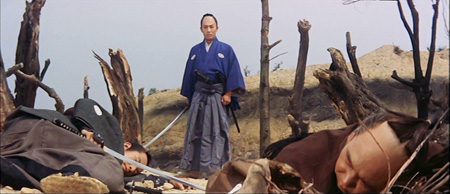 .
.
Oct 2011:
.
<<The Australian Government condemns Japan’s decision to continue whaling in the Southern Ocean this year under the guise of science. Australia remains resolute in its opposition to all commercial whaling, including Japan’s so-called ‘scientific whaling’.
Foreign Minister Kevin Rudd said the Government was particularly disappointed that this whaling will take place in the Southern Ocean Whale Sanctuary established by the International Whaling Commission.
.
Mr Rudd:
“There is widespread concern in the international community at Japan’s whaling program and widespread calls for it to cease. The Government has always been firm in our resolve that if we could not find a diplomatic resolution to our differences over this issue, we would pursue legal action. This is the proper way to settle legal differences between friends.”
.
Attorney-General Robert McClelland said the decision to commence proceedings in May 2010 was not taken lightly.
“Australia believes Japan’s whaling is contrary to international law and should stop,” said Mr McClelland. “That is why Australia is taking our case in the International Court of Justice to bring to an end Southern Ocean whaling permanently.”
Environment Minister Tony Burke said the decision to take legal action demonstrated the strength of Australia’s commitment.
“The Australian Government remains opposed to all commercial whaling, including so-called ‘scientific whaling,” Mr Burke said. “We will keep working to achieve a permanent end to all commercial whaling.”>>
.
[Source: ‘Japanese Decision to Continue Whaling’, 20111004, media release by The Hon. Kevin Rudd MP, Australian (then) Minister for Foreign Affairs, ^http://foreignminister.gov.au/releases/2011/kr_mr_111004a.html].
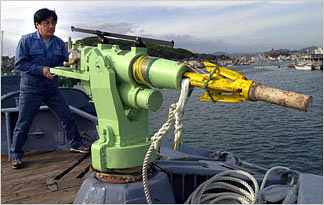 Japan uses grenade tipped harpoons
Japan uses grenade tipped harpoons
.
Dec 2011:
.
<<Japan’s whaling authorities are suing militant environmentalists Sea Shepherd for ‘harassing’ whale hunters.
It is the first time that Japan has attempted legal action abroad against anti-whaling campaigners, who have sometimes used extreme methods against ships involved in the hunt, carried out under rules that allow research whaling.
“Today, Kyodo Senpaku Kaisha and the Institute of Cetacean Research along with research vessels’ masters filed a lawsuit against the Sea Shepherd Conservation Society (SSCS) and Paul Watson,” they said in a statement. “The Institute of Cetacean Research and Kyodo Senpaku are seeking a court order in the US District Court in Seattle, Washington that prevents SSCS and its founder Paul Watson from engaging in activities at sea that could cause injuries to the crews and damage to the vessels.”
Kyodo Senpaku owns ships, while the cetacean institute operates the whaling programme under the authority of the Japanese government.
Sea Shepherd, based in Washington state in the US, regularly sends vessels to harass the whalers. In previous years it has thrown stink bombs onto the decks of the Japanese fleet, while vessels from both sides have repeatedly clashed.
The Japanese statement said the whaling programme was “greatly contributing to the advancement of scientific knowledge of whale resources in the Antarctic”.
Commercial whaling was banned under a 1986 International Whaling Commission agreement. “Lethal research” is allowed, but other nations and environmental groups like Sea Shepherd condemn it as disguised commercial whaling.
Tokyo says the whale hunts are needed to substantiate its view that there is a robust whale population in the world. However, it makes no secret of the fact that whale meat from this research ends up on dinner tables and in restaurants.
The statement condemned Sea Shepherd’s actions as “life-threatening”.
“Sabotage activities against the research fleet by SSCS and Paul Watson have been escalating over several years,” it said. “The activities perpetrated by SSCS and Paul Watson not only put at risk the safety of the research vessels at sea but are also affecting the scientific achievement” of the program, it said.
In February, Japan cut short its hunt for the 2010-2011 season by one month after bagging only one fifth of its planned catch, blaming interference from Sea Shepherd.
.
Mr Watson (Sea Shepherd founder):
“We are not down there protesting whaling, we are down there intervening against criminal activities. We defend ourselves from being rammed, hit with water cannons, shot at, have concussion grenades and bamboo spears thrown at us, so yes, we defend ourselves. The United States government and courts have no authority over these ships so I don’t know what they are hoping to achieve.”
.
Mr Watson – who travels to Australia each year to lead activists in their efforts against the whale hunt – said that the ships his organisation used were not owned by Sea Shepherd USA, nor were they US-flagged vessels.
The Japanese legal action came after the whaling fleet left port on Tuesday for this season’s annual hunt.
The coast guard has deployed an unspecified number of guards to protect the ships from anti-whaling activists, and the Japanese government has confirmed it will use some of the public funds earmarked for reconstruction after the massive March earthquake and tsunami to boost security for the hunt.
Three ships from the Sea Shepherd fleet are due to set sail over the coming days to once again confront the Japanese whalers, the organisation said. The Steve Irwin and the MV Brigitte Bardot will leave from Albany in Western Australia and the MV Bob Barker will depart from Hobart.>>
.
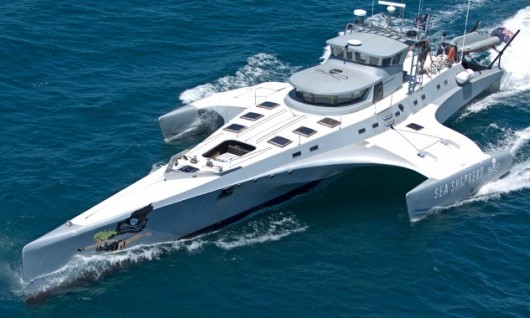 MV Brigitte Bardot – whale defender
MV Brigitte Bardot – whale defenderNamed after the famous French actress, who remains most supportive of Sea Shepherd’s cause to stop whaling
.
“Being outraged by the fact that he’s been put in prison, I offer to take his place because I am his accomplice,” Bardot, 77, said in a statement. “I have always supported Paul Watson, my brother in arms,” said the retired French actress who had a Sea Shepherd trimaran named after her in 2011.
.
[Source: Sea Shepherd hit by legal harpoon’, 20111209, by AFP, Herald Sun newspaper, ^http://www.heraldsun.com.au/ipad/sea-shepherd-hit-by-legal-harpoon/story-fn6s850w-1226218642187].
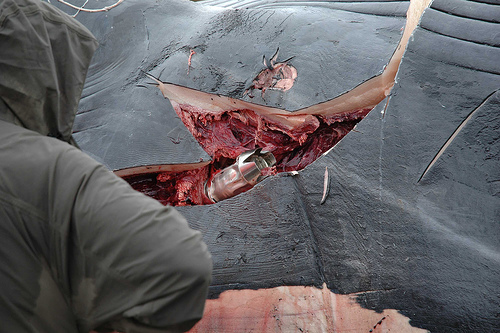 Criminal Whaling
Criminal Whaling
.
Jan 2012:
.
<<Japan’s whaling fleet has left its home port for another turbulent season in the Southern Ocean, this year courtesy of extra money from the nation’s earthquake recovery fund.
Three vessels have set sail from the port of Ishinomaki, in western Japan, with a mission to catch 900 whales over the next three months.
The Japanese fleet will have beefed-up security this year after its last season was cut short by the Sea Shepherd anti-whaling group.
The fleet did not get anywhere near its target last season and Sea Shepherd is hoping for a repeat performance.
But there is anger in Japan and elsewhere this year about the source of new funds for the trip.
.
The Japan Fisheries Agency says the trip’s use of $28 million from the earthquake recovery fund is legitimate, because it is taken from the government’s own quake recovery fund.
.
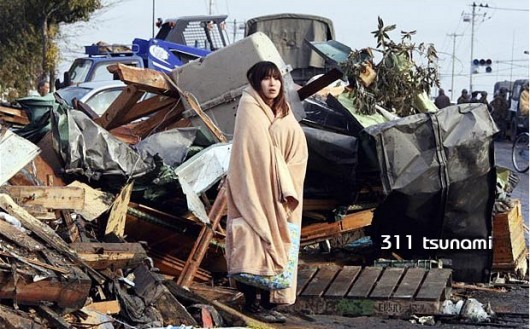 Once again, the male dominated Japanese Government turns its back on its own
Once again, the male dominated Japanese Government turns its back on its own
.
Greenpeace Japan executive director Junichi Sato says it is a massive stretch to link whaling to the earthquake.
“It’s not related to the recovery at all,” he said. “It is used to cover the debts of the Whaling Programme because the Whaling Programme itself has been suffering from big financial problems.”>>
.
.
[Source: Japanese whalers get $28m in earthquake cash’, 20120131, by Adam Harvey, AM Programme, ABC News, ^http://www.abc.net.au/news/2011-12-07/japan-whaling-fleet-embarks/3716546].
Jan 2013:
.
Former Greens leader Bob Brown says fear of a diplomatic fallout is preventing Australia from standing up to Japan on whaling.
.
Watch Video:
[Source: ABC News, 20130102, ^http://www.abc.net.au/news/2013-01-02/bob-brown-speaks-about-sea-shepherd/4450224]
Dr Brown, who is now a member of the Sea Shepherd board, also stood behind Sea Shepherd skipper Paul Watson, who jumped bail in July in Germany while being detained over an incident off the coast of Costa Rica in 2002.
The former senator says he wants the Australian Government to seek an international court injunction to stop Japan’s annual whale hunt in the Southern Ocean.
“They’re worried. They want a free-trade agreement, they’re worried that this is going to, in some way or other, annoy politicians in Tokyo,” he said.
“There’s a lot of Australians who are annoyed that the Australian Government, and indeed the Opposition when it was in government, haven’t stood up to the Japanese. And it’s time they did.”
Dr Brown said he has nothing but praise for Watson.
Interpol has issued an arrest alert for Watson, who is wanted in Costa Rica over charges relating to a confrontation over shark finning.
Watson has since said he is back on board an activist vessel and ready to confront whalers.
“I’ve admired Paul Watson and Sea Shepherd for 30 years,” Dr Brown said.
“They have done a fantastic job. It’s been non-violent, they have never harmed anybody in that process.”
The former senator also wants the Government to ensure the safety of the Sea Shepherd’s four ships and crew.
“This time they (the Japanese) have armed coastguard people – this is men with guns on their ships coming into the demilitarised zone in Antarctica – while our Government and governments elsewhere sit on their hands and allow this international law-breaking,” he said.
“It’s Sea Shepherd that’s upholding the law here.”
.
 Paul Watson and his Sea Shepherd Crew
in search of Japanese Whale Killing Ships
Voluntarily undertaking the job of the Australian Government.
Paul Watson and his Sea Shepherd Crew
in search of Japanese Whale Killing Ships
Voluntarily undertaking the job of the Australian Government.
.
[Source: ‘Brown calls on Government to protect Sea Shepherd’, 20130102, ^http://www.abc.net.au/news/2013-01-02/bob-brown-speaks-about-sea-shepherd/4450224].
30 Jan 2013:
.
<<Anti-whaling activists Sea Shepherd say they have made their first contact with Japanese whalers in the Southern Ocean this season.
The group says its vessel the MV Brigitte Bardot intercepted harpoon ship the Yushin Maru 3 yesterday.
In a statement, Brigitte Bardot captain Jean Yves Terlain said the position of the whaling boat indicates it has not yet killed any of the mammals.
“The Yushin Maru 3 was on a westerly course, indicating that the fleet has been in bad weather for the past several days,” he said.
“The latitude at which they were found was rather far north and given that the large concentrations of whales are found further south, closer to the Antarctic Continent where there are high concentrations of krill, this would indicate that they have not yet begun whaling.”
Sea Shepherd says this year’s mission is its largest to date, involving four ships and more than 120 crew.
Mission chief and former Greens leader Bob Brown say it is also shaping up to be the most successful.
“We’re one day short of the end of January, the prime killing month for these whaling fleets, and they haven’t yet been able to kill a whale,” he said. “Sea Shepherd is very, very happy.”>>
.
[Source: Sea Shepherd intercepts Japanese whaling fleet’, 20130130, ^http://www.abc.net.au/news/2013-01-30/sea-shepherd-intercepts-japanese-whaling-fleet/4491686].
Feb 2013:
.
.
<<Japan has begun injecting new tax-payer-funded subsidies into its whaling program in a bid to keep the fleet afloat, the ABC has learned.
It is believed the “profitable fisheries program” is helping to keep the so-called scientific research program’s ongoing debts at bay and to help refit the whaling fleet’s flagship.
With the Japanese fleet now entering Antarctic waters, the annual whale wars are again expected to flare any day.
Militant Sea Shepherd activists have been able to all but scupper the fleet’s catch over the past few years.
This, plus lower demand for whale meat, means the government has been forced to prop up the whaling program.
Some of the money has come from funds set aside for the rebuilding of communities shattered by the 2011 tsunami.
And now it appears more cash has come from the new taxpayer-funded subsidy.
“This subsidy is supposed to help fishermen in financial trouble,” investigative journalist Junko Sakuma said.
“Now it’s propping up the unprofitable whaling fleet, and if they keep running a loss, they won’t even have to pay it back.”
Documents seen by the ABC suggest the subsidy has already been used to partly refit the whaling fleet’s mother ship, the Nisshin Maru, with a smoking room and internet connections.
Patrick Ramage is the whale program director at the International Fund for Animal Welfare.
Tomorrow he will release a report into just how the Japanese whaling industry is propped up financially.
“The most important finding of this new report is really three things: first, that whaling is an economic loser in the 21st century, second, that the Japanese people have lost their appetite for whale meat, and third that whale watching rather than whale killing is the economically beneficial whale industry for the 21st century,” he said.
Even the strongest supporters of whaling in Japan are pessimistic about the future of the hunt, especially with the government forced to pump in more subsidies into the fleet to keep it afloat.
Masayuki Komatsu is a former Japanese delegate to the International Whaling Commission and one of the architects of the country’s scientific research program.
He warns that the injection of this new subsidy is a sign that program is in big trouble.
“It’s not sustainable, right. How long can you get such money from the government? Everybody likes money, particularly other people’s money,” he said.>>
.
[Source: ‘Taxpayers bailing out Japanese whalers’, 20130204, by North Asia correspondent Mark Willacy, AM (radio programme), ABC News, ^http://www.abc.net.au/news/2013-02-04/taxpayers-bailing-out-japanese-whalers/4498602].
1 Feb 2013:
.
<<The Federal Government has ordered a Japanese whaling vessel to get out of Australia’s exclusive economic zone.
The Shonan Maru Number 2 – a Customs vessel which travels with the whaling fleet – entered the zone off Macquarie Island in the Southern Ocean yesterday afternoon.
Environment Minister Tony Burke said he had made it clear to Japan that vessels associated with the whaling program “are not welcome in in Australia’s exclusive economic zone or territorial sea”.
“Our embassy in Tokyo has conveyed these sentiments directly to the Japanese government,” Mr Burke said in a statement.
Former Greens leader Bob Brown, now the mission leader of the Sea Shepherd anti-whaling group, says he believes the vessel has armed Japanese personnel aboard.
.
Mr Brown:
“It is accompanying the whaling ships into the killing fields off Antarctica. When the Sea Shepherd ship Bob Barker made contact with the factory ship, this ship tailed Bob Barker and has been doing so for a couple of days. The Bob Barker has lost the [factory ship] Nisshin Maru but that was after it was hunted out of the whaling area and this Customs vessel, this government vessel, has kept with the Bob Barker through to Macquarie Island and into Australia’s economic zone waters.”
.
Mr Brown says the Shonan Maru stopped this morning just outside Australia’s territorial waters. He says there may be legal arguments about who has control over exclusive economic zones.
.
Mr Brown:
.
“Tokyo has ignored the call from the Federal Government for this part of the whaling fleet not to enter our exclusive economic zone. It’s stayed outside the direct territorial waters but it has not obliged that request and protest from Australia that it should not enter our exclusive economic zone. That is a matter of some affront to Australia and one that I’ve no doubt the Federal Government will be looking to deal with during today.” >>
.
.
[Source: Japanese whalers ordered out of Australian waters’, 20130201, by Samantha Donovan and staff, ^http://www.abc.net.au/news/2013-02-01/government-orders-japanese-whalers-out/4495166]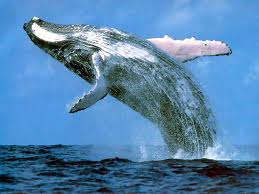 .
.
